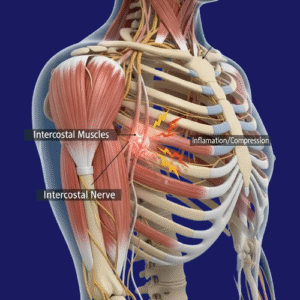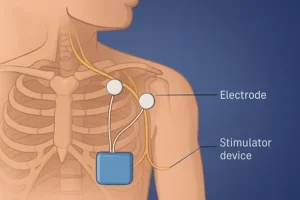What Is Intercostal Neuralgia
Intercostal neuralgia is a type of neuropathic pain that arises from irritation, inflammation, or injury to the intercostal nerves, which run between the ribs. These nerves play a key role in transmitting sensory information from the chest and abdominal regions to the brain. When these nerves become damaged or compressed, it can result in a sharp, burning, or stabbing pain along the rib cage or chest area. Intercostal neuralgia can occur as a result of various underlying conditions, including trauma, viral infections, or spinal issues. Although it is not a common disorder, its impact on daily life can be significant due to the persistent and sometimes debilitating pain it causes. Understanding its causes, symptoms, treatment options for intercostal neuralgia is important for managing and alleviating this condition.
Causes of Intercostal Neuralgia
Intercostal neuralgia is a condition characterized by sharp, stabbing pain along the intercostal nerves, which are located between the ribs. It can arise from a variety of causes, often involving nerve irritation, injury, or inflammation. Common causes of Intercostal Neuralgia include trauma or surgery involving the chest area, such as rib fractures, thoracic surgery, or mastectomy. Viral infections, particularly shingles (herpes zoster), can also lead to intercostal neuralgia pain by damaging the nerve fibers. Other factors that cause Intercostal Neuralgia include nerve compression due to spinal disc herniation, tumors, or prolonged pressure on the thoracic area, and in some cases, diabetes or other systemic conditions that affect nerve health,resulting in nerve pain in chest.
Symptoms of Intercostal Neuralgia
The primary symptom of Intercostal Neuralgia is a sharp, stabbing, or burning pain along the ribs or chest, often radiating to the back or abdomen. The primary symptom of intercostal neuralgia is sharp, stabbing pain along the ribs or chest, often radiating to the back. Many patients worry if this nerve pain in the chest is serious, but in most cases, it is related to irritated or inflamed intercostal nerves rather than heart conditions. The nerve pain in the chest is typically unilateral (affecting one side of the body) but can occasionally be bilateral. It may worsen with movement, deep breathing, coughing, or sneezing. Some patients may also experience heightened sensitivity in the affected area, known as allodynia, where even light touch can trigger discomfort. Numbness or tingling may also occur, particularly if the condition is related to nerve compression or irritation. The intensity and duration of pain can vary, with some individuals experiencing episodes lasting days, weeks, or even months.
Diagnosis of Intercostal Neuralgia
Diagnosis of Intercostal Neuralgia generally involves a thorough medical history and physical examination. Doctors typically ask about the onset and nature of the pain, any history of trauma, surgeries, or infections, and any associated symptoms like tingling or numbness. Imaging studies, such as X-rays, MRI, or CT scans, may be used to rule out underlying causes like rib fractures, tumors, or spinal issues that could be compressing the intercostal nerves. Nerve conduction studies or electromyography (EMG) may also be performed to assess the function of the nerves and rule out other conditions that may present with similar symptoms, such as neuropathies or thoracic outlet syndrome.

Treatment of Intercostal Neuralgia
Treatment options for intercostal neuralgia typically focuses on relieving pain and addressing the underlying cause if identified. Pain management often includes nonsteroidal anti-inflammatory drugs (NSAIDs), opioid medications, or anticonvulsants like gabapentin, which can help manage nerve pain. For more severe cases, corticosteroid injections or nerve blocks may provide longer-lasting pain relief. These minimally invasive injection therapies are often used to target inflammation and nerve irritation directly, offering faster and more focused relief compared to oral medications.If the condition is caused by a viral infection like shingles, antiviral medications may be prescribed. Physical therapy may also be beneficial in cases where muscle tension or poor posture is contributing to nerve irritation. In rare cases, surgery might be considered if Intercostal Neuralgia is caused by nerve compression that cannot be managed through other means.
Prognosis
Prognosis depends on the underlying cause and the severity of the symptoms. In many cases, the condition improves with appropriate treatment, such as pain management and addressing any contributing factors like infection or nerve compression. For individuals with post-herpetic neuralgia (a complication of shingles), the pain may persist for months or even years, though it often becomes less intense over time. In general, with proper care, most people experience some level of symptom relief. However, chronic intercostal neuralgia can significantly affect quality of life, and in some cases, it may become a recurrent or long-term issue. Regular follow-up care and personalized treatment options for intercostal neuralgia are often necessary to manage symptoms and adjust treatment as needed.If you’re experiencing symptoms of intercostal neuralgia, don’t wait. Consult a specialist today to explore personalized care and find relief tailored to your needs.



